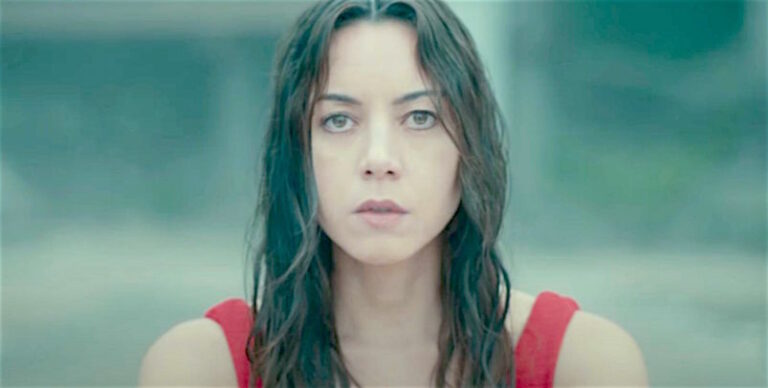By Mark Saldana
Rating: 3.5 (Out of 4 Stars)
The black bear is that elephant in the room that is the soul of humanity. It is the ugly, animalistic beast that often destroys, maims, and wreaks havoc when it escapes us. The black bear often emerges from within the hearts and souls of artists as they seek to create. That is the cruel irony of art, or at least that is what writer/director Lawrence Michael Devine expresses in a unique film about the creative process of art and its inevitable power to destroy.
Though the movie as a whole is an enigma of its own, it works as an expressive and sometimes powerful representation of the enigma that is the creative process. I know that sounds overly complex and possibly convoluted, but when separately considering the two vignettes that make up a sometimes confusing movie, it all makes sense in an abstract way. At the center of this film is Aubrey Plaza who portrays two different characters with similar motivations, but through vastly different personalities.
In the first vignette, Plaza portrays Allison, a filmmaker and retired actor seeking quiet and solitude in a cabin in the woods to begin work on her next project. The cabin is run by a married couple named Blair and Gabe. Blair is an expectant mother who believes in more traditional “values” while Gabe is a musician whose work as an artist has been mostly sidelined by the demands and responsibilities of husbandry and an upcoming fatherhood. During her first night at the cabin, Allison gets invited to a night of dinner and drinks with Blair and Gabe that starts off awkwardly, but then eventually gets ugly. As the drinks flow, so do the repressed feelings of both Blair and Gabe.
Just when things come to a head, the audience gets a bit of a reboot and the cabin in the woods becomes the set of a movie where the characters are similar to the characters of the first vignette. The difference is Allison is an actor portraying the “victimized” wife, while Gabe is the director of the film and Blair plays the role of the guest. In this chapter, Blair and Gabe toy and torment with Allison’s feelings to get her to deliver a performance of a lifetime. Once again, things devolve into something ugly and disturbing with the “Black Bear” emerging to cause some real damage.
Now, I hope I didn’t reveal too much in my synopsis, but given the complicated nature of the overall picture, this was a tough movie to summarize. Anyway, I have to say that this film, as a whole, is definitely a unique experience. As bewildering it is to reflect on the movie in its entirety, reflecting on its two vignettes offered me some clarity as to what Lawrence Michael Devine is trying to express. And with that clarity in mind, I really loved this film. It is a deeply introspective look at what artists experience, feel and often have to do to create their work. It is a pure and raw exploration of the cannibalistic/carnivoristic nature of art.
Devine’s screenplay is incredible with some tremendous dialogue and character development. As a director, Devine channels the inspirations of Linklater and Altman (particularly in the second vignette), but definitely has his own defiant voice. Working with cinematographer Robert Leitzell, Devine gives the movie a starkly bleak look in the first part with a frenetic, nearly chaotic feel in the second part. The two parts have different energies and Leitzell knows how to beautifully capture these two different moods.
As this is a character-driven movie, with various types of characters, sometimes portrayed by the same actors, the film demands the performers to really earn their pay. Sarah Gadon impresses as does Christopher Abbott. These two talented actors portrays their different characters superbly and dynamically. The supporting cast which includes Lindsay Burdge, Alexander Koch, Jennifer Kim, and Shannon O’Neill never miss a beat, even in the chaotic environment of a film set.
It is Aubrey Plaza, however, who shines the brightest as both the conniving and drama-instigating filmmaker and also as the insecure and slippery slope-gliding actress. I have not seen Aubrey as dynamic and expressive, asshe is in this movie. The two roles she plays demand nuiance, volatility, and vulnerability. Plaza gives the movie what it demands and it is beautiful. This film should be the breakthrough role that allows her more versatility with her career.
My main concern, however, is that this art-house movie probably will fly below the public’s radar. In this age of COVID-19, with people not going to the movies, and mostly watching movies at home, I fear this film will not get the attention it deserves. I must highly recommend that people seek this film out, as it represents a unique brand of filmmaking that only comes around so often. This will also give Aubrey Plaza the opportunity to expand the variety of work she clearly deserves. Black Bear opens in some theaters and on digital platforms on December 4, 2020.
